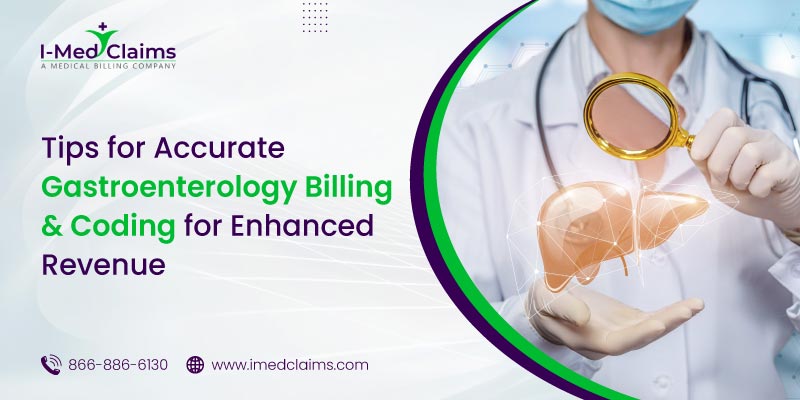Gastroenterology billing and coding can be a complex and challenging process. This specialized discipline comes with its own set of intricate challenges in the realm of billing, owing to the complex nature of gastrointestinal issues. Recent findings from Precedence Research underscore this magnitude, projecting the gastroenterology market to burgeon from a 2023 value of USD 54.56 billion to an impressive USD 93.8 billion by 2032. Driving this growth is a medley of factors, including the upsurge in gastrointestinal disorders attributed to shifting dietary patterns, the expansion of reliable clinical investigations, escalating healthcare outlays, and the swaying tide of an aging population. Such rapid expansion ushers in an imperative for gastroenterology practices to streamline their revenue cycle and extract maximal reimbursements. This blog post will provide useful tips to ensure accurate billing and coding for enhanced payment in gastroenterology practices.
Overview Of Gastroenterology Billing Services
Gastroenterology billing and coding services are crucial for managing the financial aspects of this specialized medical field. Gastroenterology focuses on digestive system disorders, from the mouth to the anus. Gastroenterologists must navigate intricate coding guidelines and payer-specific rules to ensure proper reimbursement. Gastroenterology billing involves managing the codes and procedures linked to billing insurance companies for patients’ gastroenterology treatments. Precise medical coding guarantees that insurers possess the necessary diagnostic codes for accurate reimbursement. Accurate coding also holds significance for analyzing demographics, studying disease frequency, treatment effectiveness, and systems based on accountable reimbursement.
Critical challenges in gastroenterology billing include distinguishing between colorectal cancer screenings and colonoscopies, handling motility and GI function studies, and effectively applying modifiers like -51, -59, and -26. Endoscopy billing within gastroenterology requires specialized skills to track and rectify underpayments, often surpassing the capabilities of standard billing software and in-house staff. Failing to address underpayments can lead to significant revenue loss for GI practices.
Common Gastroenterology Billing and Coding Errors
Here are the frequent billing and coding errors in gastroenterology practice to avoid costly mistakes and ensure accurate reimbursement.
Documentation Gaps
Gaps in documentation pose a significant threat to revenue. Incomplete capture of essential data during clinical documentation and coding can lead to claim rejections and denials. The absence of proper documentation turns delayed revenues into permanent losses, mainly as payers demand proof of medical necessity. Clear and comprehensive documentation is paramount.
Incorrect Modifier Usage
Misusing modifiers is a prevalent GI coding mistake. The confusion between modifiers 51 and 59 often leads to claim rejections. Modifier 51 applies when two different-category procedures are performed on the same day. On the other hand, modifier 59 is used for procedures at different sites or those not typically combined on the same day.
Neglecting CPT Updates
Staying abreast of annual CPT code set changes is critical for gastroenterology practices. Updates introduce alterations in code application, removal of outdated codes, and new code additions. Remaining informed about these updates is vital to prevent costly claim denials.
Top-tier Strategies for Accurate Gastroenterology Billing and Coding Services
Here are some starting tips for achieving accurate gastroenterology billing and coding:
Familiarize Yourself with Coding Guidelines
It is essential to stay up-to-date with the latest coding guidelines specific to gastroenterology. Familiarize yourself with the CPT (Current Procedural Terminology) codes, modifiers, and any relevant billing rules. Understanding these guidelines will help you appropriately code the procedures performed by gastroenterologists, resulting in accurate billing.
Proper Documentation
Proper documentation is one of gastroenterology’s most important aspects of accurate billing and coding. Ensure that all the necessary information is documented thoroughly in the patient’s medical record. This includes the patient’s symptoms, diagnosis, treatments provided, and any procedures performed. Accurate and detailed documentation will support the codes selected and help prevent claim denials.
Understand Gastroenterology Specific Codes and Modifiers
Gastroenterology-specific codes and modifiers are essential for accurate billing. Take the time to understand the specific codes and modifiers used in gastroenterology, such as those for Upper GI endoscopy (e.g., CPT codes 43235, 43239) or Lower GI endoscopy (e.g., CPT codes 45378, 45380). Utilize the correct modifiers to indicate any additional procedures or services performed properly.
Stay Updated with Reimbursement Policies and Regulations
Reimbursement policies and regulations are constantly evolving in the healthcare industry. It is crucial to stay updated with the latest changes to ensure accurate billing and maximize revenue. Regularly review the Medicare Physician Fee Schedule and any private payer policies to understand the reimbursement rates and guidelines applicable to gastroenterology procedures.
Regularly Audit Your Coding and Billing Processes
Perform regular coding and billing process audits to identify any potential inaccuracies or errors. This will help you identify improvement areas and ensure coding guidelines compliance. Consider seeking assistance from a professional coding auditor to conduct an in-depth review of your processes and provide valuable feedback.
Invest in Continuing Education and Training
Gastroenterology billing and coding is a specialized field that requires ongoing education and training. Invest in educational resources, attend seminars, and consider certifications to enhance your knowledge in this domain. Staying current with the latest gastroenterology billing and coding developments will greatly contribute to accurate and efficient revenue generation.
Collaboration
In the realm of gastroenterology medical billing, success thrives on teamwork. Physicians are entrusted with precise documentation and forwarding charges to the billing team for claim processing. Crucially, billing staff must promptly relay noteworthy changes to physicians, fostering a seamless flow of communication. Making a symbiotic relationship with coding experts ensures submissions align with payer guidelines effectively.
Conclusion
Accurate billing and coding are essential for enhancing revenue in gastroenterology practices. Achieving accurate billing and coding in gastroenterology is crucial to avoid claim denials, delayed payments, or even legal issues. Providers should prioritize detailed documentation, up-to-date coding guidelines, and regular process audits to minimize errors. Implement these tips to streamline your billing and coding processes for enhanced profitability and maximize revenue. Working with specialized billing and coding services and utilizing technology can also help streamline the billing and coding process and improve accuracy.


